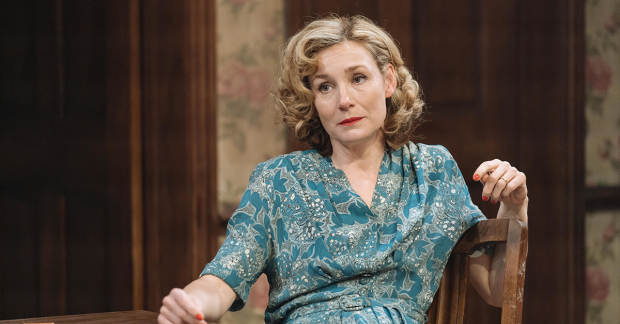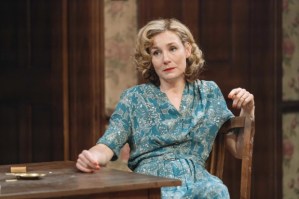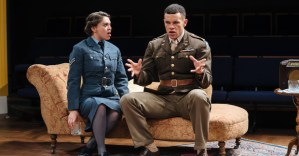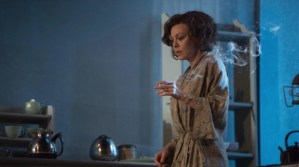Review: The Deep Blue Sea (Chichester Festival Theatre)
Nancy Carroll stars in Terence Rattigan’s brilliant play

© Manuel Harlan
What a play this is! Watching Terence Rattigan's The Deep Blue Sea, which premiered in 1952, it now seems impossible to imagine that an entire generation of angry young men once denounced its author as dusty and irrelevant. Perhaps it was because they were men. Because in the right hands, it emerges – for all its period setting – as an urgent and relevant study of women's desires and ambitions. Not to mention the destructive dangers of love, for men and for women.
In the intimate and involving setting of Chichester's smaller Minerva Theatre, director Paul Foster has given it a production of intense, heart-piercing directness. Peter McKintosh's dingy room of a set captures how pinched and confined Hester Collyer's life has become in the 10 months since she left her High Court judge of a husband to follow her passion for the ex-RAF flyer Freddie Page. Charred bomb damage surrounds the scene, symbolic of both the war and the emotional wreckage that action has left in its wake.
The play was famously inspired by the suicide of Rattigan's former lover Kenny Morgan, but Hester survives the attempt to take her own life with which it opens. She has, under the law of the time, just committed a criminal act which could see her imprisoned. When the disgraced doctor who lives in a flat upstairs asks her why she did, she replies: "Anger, hatred and shame" and all of those qualities find a note in a production that pays careful attention to every detail. It's not just passion for a younger man that has driven Hester to such extremes, but a fury at her own inability to resist it.
Ever since she won an Olivier for her performance opposite Benedict Cumberbatch in After the Dance at the National Theatre, Rattigan fans have been waiting to see Nancy Carroll play Hester. She doesn't disappoint. She has extraordinary intensity with a kind of emotional nakedness which means she that doesn't seems to act at all but rather to embody the character she is playing.
Here she registers every flicker and nuance of Hester's changing moods. She is both the perfect hostess, all brittle upper-class jollity, and a lost woman whose every emotional nerve is exposed. There's a wonderful moment early on, when her priggish upstairs neighbour (Ralph Davis) explains that she failed to kill herself because she hadn't put a shilling in the gas meter. Carroll registers the split second of regret, before moving on to the formal "that was so lucky". Her scream down the stairs, all inhibition and dignity lost, when Freddie leaves her is all the more shocking because her gentle control and stillness earlier has been so beautifully painted. This is a Hester who can make you cry at her agony, but also admire her courage.
Yet Hadley Fraser's Freddie is also terrific. There's a tendency to make the former test pilot and RAF ace a heroic, romantic figure; Fraser takes the more difficult path of making him a Bertie Wooster-style oaf, a golf club bore, a blustering narcissist so bound up in his own woes that he barely registers the suffering of others. Yet having made him so thoroughly unlikeable that the audience gasp at his cruelty, Fraser still makes you understand this man whose "life stopped in 1940", and also why he and Hester "are death to each other". By the close he too has acquired a kind of nobility.
But everywhere Foster has generated performances that lend resonance to every characters: Gerald Kyd is a stuffed-shirt of a former husband, Denise Black makes the landlady Mrs Elton a bustling busybody and a source of genuine kindness. Laurence Ubong Williams, talking sense as Freddie's friend, provides a glimpse of the RAF camaraderie and willingness to forgive that sustained a generation; Helena Wilson makes something of nothing as the uptight neighbour who is thrilled by the salacious goings-on but also sensible enough to understand the need for silence.
As the doctor Miller with his advice that "the world is a dark enough place for even a little flicker to be welcome", Matthew Cottle provides a grave, caring signpost to a kind of hope. When Hester throws herself convulsively into his arms, it's a moving reminder of exactly why Rattigan's great play has stood the test of time as a bulwark of humanity in a difficult, uncaring world.



















